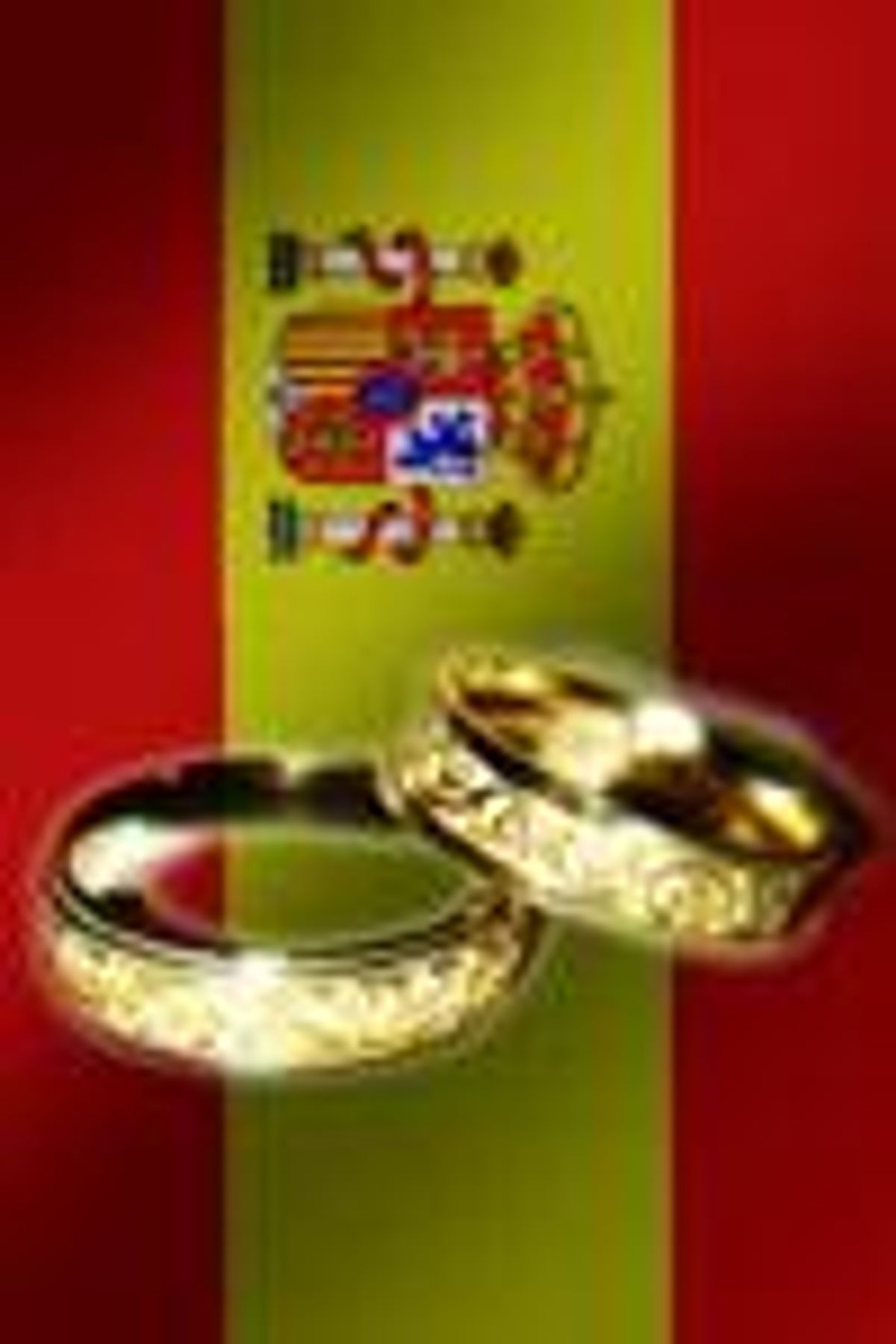Spain's
parliament legalized same-sex marriage Thursday, defying
conservatives and clergy who opposed making traditionally
Roman Catholic Spain the third country to allow
same-sex unions nationwide. Jubilant gay activists
blew kisses to lawmakers after the vote. The measure passed
the 350-seat Congress of Deputies by a vote of
187-147. The bill, part of the ruling Socialists'
aggressive agenda for social reform, also lets gay
couples adopt children and inherit each other's property.
The bill is now law. The senate, where
conservatives hold the largest number of seats,
rejected the bill last week. But it is an advisory body,
and final say on legislation rests with the Congress of Deputies.
After the final tally was announced, gay and
lesbian activists watching from the spectator section
of the ornate chamber cried, cheered, hugged, waved to
lawmakers, and blew them kisses.
Several members of the conservative opposition
Popular Party, which was vehemently opposed to the
bill, shouted, "This is a disgrace." Those in favor
stood and clapped.
The Netherlands and Belgium are the only other
two countries that allow same-sex marriage nationwide.
Canada's House of Commons passed legislation Tuesday
that would legalize marriage equality for same-sex
couples; its senate is expected to pass the bill into law by
the end of July.
Spanish prime minister Jose Luis Rodriguez
Zapatero noted this in the debate before the vote. "We
were not the first, but I am sure we will not be the
last. After us will come many other countries, driven,
ladies and gentlemen, by two unstoppable forces:
freedom and equality," he told the chamber. Zapatero
said the reform of the Spanish legal code simply adds
one dry paragraph of legalese but means much more. He called
it "a small change in wording that means an immense change
in the lives of thousands of citizens. We are not
legislating, ladies and gentlemen, for remote unknown
people. We are expanding opportunities for the
happiness of our neighbors, our work colleagues, our
friends, our relatives." Zapatero lacks a majority in
the chamber but got help from small regional-based
parties that tend to be his allies.
Spanish gay couples can get married as soon as
the law is published in the official government
registry. This could come as early as Friday or within
two weeks at the latest edition, parliament's press
office said.
Popular Party leader Mariano Rajor said after
the vote that Zapatero has deeply divided Spain and
should have sought a consensus in parliament that
recognized same-sex unions but didn't call them marriages.
Rajor said that if the vast majority of countries in
the world don't accept same-sex marriage, including
some run by Socialists, there must be a reason.
"I think the prime minister has committed a grave act of
irresponsibility," Rajor told reporters.
Beatriz Gimeno, a longtime leader of the gay
rights movement in Spain, held back tears as she
hugged her partner, Boti, after the vote. "It is a
historic day for the world's homosexuals. We have been
fighting for many years," Gimeno said. "Now comes the
hardest part, which is changing society's mentality."
The marriage bill was the boldest and most
divisive initiative of the liberal social agenda
Zapatero has embarked on since taking office in April
2004. Parliament overhauled Spain's 25-year-old divorce law
on Wednesday, also irking the church, by letting
couples end their marriage without a mandatory
separation or having to state a reason for the
split-up, as required under the old law. He has also pushed
through legislation allowing stem-cell research and
wants to relax Spain's restrictive abortion law.
The Roman Catholic Church, which held much sway
over the government just a generation ago when Gen.
Francisco Franco was in power, had adamantly opposed
same-sex marriage. In its first display of antigovernment
activism in 20 years, it endorsed a June 18 rally in which
hundreds of thousands marched through Madrid in
opposition to the bill. Some 20 bishops took part in
the June 18 rally. On Wednesday a Catholic lay group
called the Spanish Family Forum presented lawmakers with a
petition bearing 600,000 signatures as a last-minute
protest. Late last year the spokesman for the Spanish
Bishops Conference, Antonio Martinez Camino, said that
allowing same-sex marriage was like "imposing a virus on
society--something false that will have negative
consequences for social life."
Despite the street protests in Madrid and
elsewhere and the petition drive, polls suggest that a
majority of Spaniards support marriage equality for
all citizens. A survey released in May by pollster Instituto
Opina showed that 62% of Spaniards support the
government's action on this issue, while 30% oppose
it. The poll had a margin of error of three percentage
points. But surveys show that Spaniards are evenly split
over whether gay couples should be allowed to adopt
children. (AP)


















































































Viral post saying Republicans 'have two daddies now' has MAGA hot and bothered